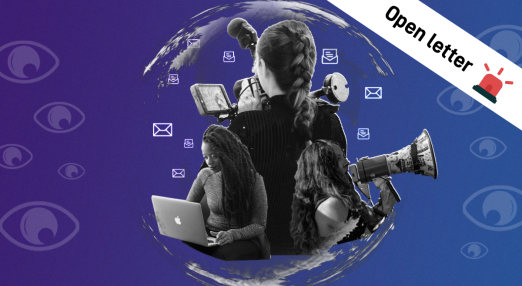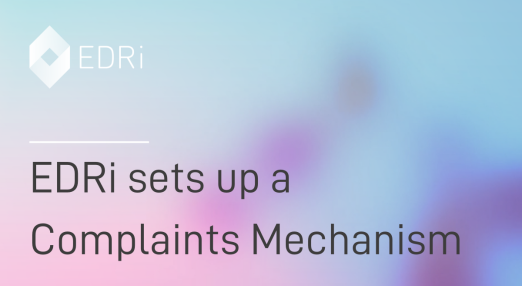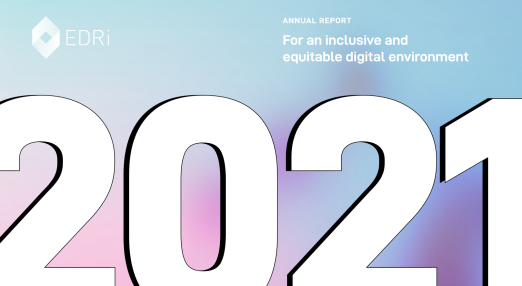Information democracy
Powerful companies and governments control the way the internet and new technologies are deployed. These actors blur the lines on corporate power in ways that have tremendous impact on people and democracies. The dominant business model of ‘Big tech’ platforms is based on surveillance, polarization and power imbalances. This ‘surveillance capitalism’ has had a global impact on democracy. For example, state and private actors can use the internet and technologies to spread political disinformation, to manipulate electoral results, to attack human rights defenders and to limit civic space.
Filter resources
-

“e-Evidence” trilogues: what’s left of fundamental rights safeguards?
In an open letter addressed to policymakers, an EDRi-led coalition of digital rights, lawyers, journalists, media organisations and internet service providers associations are ringing the alarm bell. We warn against the foreseen framework that could seriously endanger freedom of expression, privacy rights and the right to a fair trial.
Read more
-

Complaints Mechanism
The process to deal with possible issues should be clear and provide an independent review, allowing EDRi members in making decisions. EDRi members have adopted a Complaint mechanism in 2021. The mechanism is now operational.
Read more
-

EDRi-gram, 16 November 2022
In this edition of the EDRi-gram, we cheer as Austria becomes the first country to take a clear stance against the European Commission’s controversial proposal for a child sexual abuse regulation, which threatens to undermine people's right to privacy and freedom of expression. We also follow Panoptykon's, EDRi member in Poland, application against the Polish state for violating their right to privacy by allowing the intelligence agencies to act beyond scrutiny.
Read more
-

Mid-point EDRi strategy review: impact and adjustments in a changing field
In April 2020, during the early months of the Covid-19 pandemic in Europe, EDRi adopted its first network multi-annual strategy for the years 2020-2024. At the mid-term of the strategy implementation, what have we learned?
Read more
-

New EU Regulation pushes for journalism and media protection online
The European Media Freedom Act (EMFA) will intervene in the internal media market looking forward to improving the quality of media services and strengthening the integrity of the media market as a whole. EDRi finds particularly important the provisions regarding the prohibition of spyware against journalists and the rules bringing “more protection for media against unjustified online content removal”.
Read more
-

EDRi-gram, 28 September 2022
We celebrate the ruling of the Court of Justice of the European Union that the general storage of data undermines people's right to privacy and data protection. We're also exploring how a community-focused project enables young people to defend their online privacy.
Read more
-

EDRi-gram, 14 September
“What you’re saying is, for me to own a car and to drive, I have to submit that my photo and information are going to be used for policing purposes across the entire EU… Are we all walking around as citizens? Or are we all walking around as suspects?”. The European Commission’s Prüm II proposal fails to put in place vital safeguards designed to protect all of us from state over-reach and authoritarian mass surveillance practices. Check out more in the EDRi-gram.
Read more
-

EDRi-gram, 6 July 2022
“Use of digital technologies is taken as a given, and yet for a variety of reasons almost one-fifth of Czech households do not have internet access and a quarter of adults do not have a smartphone. Regrettably, in Czech media there is not much discussion about this and other challenges of the digital era.” ― Hynek Trojánek, PR coordinator for the Promoting Human Rights in the Digital Era
Read more
-

Take a virtual look back with EDRi’s interactive Annual Report: How did the EDRi network protect your digital rights in 2021?
You know privacy matters but not sure what this means in practice? Do you sense much happened in Europe last year to challenge private and state actors abusing their power in the digital age? The pandemic has left you wondering what you can do to ensure technologies work for people? Then check out EDRi’s interactive 2021 Annual Report to better understand the challenges imposed on your digital rights, and how the EDRi network addressed them. Learn and engage with our strong community so we can enjoy an inclusive and equitable digital environment.
Read more
-

EDRi-gram, 8 June 2022
In this edition of the EDRi-gram, EDRi and over 70 civil society organisations and professional bodies urge the European Commission to withdraw the CSA Regulation and call for an alternative that is compatible with the European Union's fundamental rights. The European Commission needs to understand that playing with online privacy and security affects everyone, including the very children it is supposed to help. Join us in our efforts to protect encrypted communications, open internet spaces and online anonymity.
Read more
-

Consumer and digital groups in Europe and the U.S. call for a full ban on surveillance-based advertising
On 1 June, the Transatlantic Consumer Dialogue (TACD), that EDRi is part of, published a policy resolution on banning surveillance-based advertising. The invasive practices of collecting, sharing, and processing of individual data to deliver personalized advertising, has become the primary business model in the online advertising space. Surveillance advertising is promoted by the world’s largest technology companies, like Meta (Facebook) or Alphabet (Google), and is a key driver behind the spread of misinformation, undermining democratic discourse, economic and political equity, marketplace competition, privacy, public health, and basic consumer protections.
Read more
-

EDRi-gram, 25 May 2022
In this edition of the EDRi-gram, we urge the European Parliament to make good use of the chance that the AI Act offers to regulate harmful border technologies and truly protect people on the move. We also dive deeper in the needy-greedy details of the European Commission's recent proposal for a ‘Regulation laying down rules to prevent and combat child sexual abuse’ which creates major risks to the privacy, security and integrity of private communications, not just in the EU, but globally.
Read more
